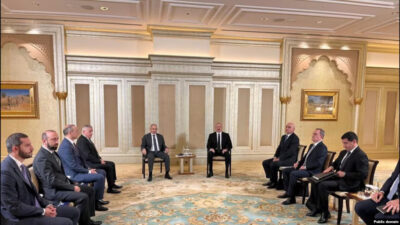YEREVAN (RFE/RL) — One year ago, on October 10, 2009, Armenia and Turkey signed two protocols aimed at normalizing relations. The signing of what many political pundits termed a “historic” deal took place in Zurich, the culmination of painstaking diplomatic efforts by the two countries’ presidents and by international mediators, primarily Switzerland and the United States.
The Western-backed process began with Turkish President Abdullah Gul’s historic September 2008 visit to Yerevan, following an invitation by his Armenian counterpart, Serge Sargisian, to attend a soccer World Cup qualifier between the national teams of the two nations.
The two leaders watched the return leg of the match in the Turkish city of Bursa a year later, just four days after their foreign ministers, Eduard Nalbandian and Ahmet Davutoglu, signed two protocols committing to the establishment of diplomatic relations and the opening of their borders after the documents’ ratification in both countries’ parliaments.
But a year on, the future of the protocols remains unclear, as no parliamentary ratification of the documents has taken place in either country. Meanwhile, the cautious optimism surrounding the future of the deal, which faced domestic opposition in both countries, has fizzled out.
Official Yerevan and political majority leaders in Armenia had repeatedly stated the country’s strong readiness to complete the ratification of the protocols in the Armenian legislature, but only after Turkey made that step first.
But since the signing ceremony, senior officials in Turkey have sought to link ratification of the protocols with progress in a separate dispute between Armenia and Azerbaijan over the region of Nagorno-Karabagh. Yerevan responded by saying the protocols contained no conditions regarding that issue and that Ankara should, therefore, proceed with the ratification of the agreements unconditionally.







